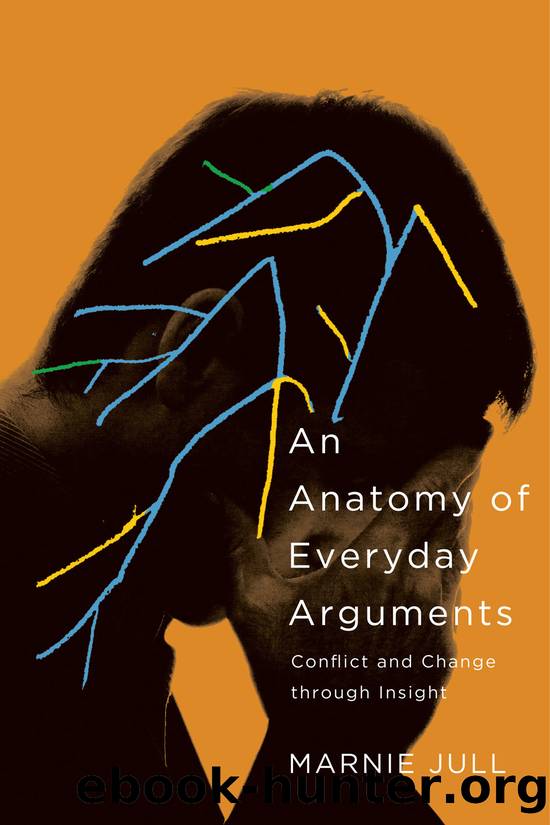An Anatomy of Everyday Arguments by Marnie Jull

Author:Marnie Jull
Language: eng
Format: epub
Publisher: McGill-Queen's University Press
Published: 2021-12-10T00:00:00+00:00
7
Tension in the Group
In this case, I was in the role of a group co-facilitator when an argument arose in one meeting that had the potential to derail an extensive deliberative process that had preoccupied the group for several months. The argument dissipated insofar as one, and then many, participants decided to engage more collaboratively rather than to defensively block the conversation from continuing. This vignette features both complexity and clarity, so although the change is partial and incomplete, it is clearly discernible.
Methodologically, because of its many aspects of complexity, this case presents significant research challenges, particularly in relation to Marshallâs (2004) activities of sense making and representation of self and others. I recognize that my processes of knowing and valuing are iterative and emergent, particularly in such dynamic contexts. I also encounter oversights in my practice and learn through the process of writing about them. A further point of accounting for quality in research is my choice of conversation partner for the debriefing inquiry and its additional layers of significance.
Conceptually, I pay careful attention to the intersubjective complexity of this space of encounter and consider my role as a leader in shaping but not determining the way that a group can know, value, and decide. I delve again into the issue of âintention reading,â looking at how I make sense of what others are thinking, even when they are not speaking. I reflect on some moment-by-moment operations of my consciousness â my knowing, valuing, and deciding. In doing so, I am able to discern moments where conflict does not arise despite the presence of threat, as well as moments of response to the conflict behaviour that actually takes place. I consider how change can occur in a space of encounter where account giving takes place in a group context, noticing that expansiveness has an influence on change.
THE VIGNETTE
I am co-facilitating a meeting for a group that is having a conflict about a difficult decision. Two days before, my colleague and I led the group through a two-hour workshop about strategies to address interpersonal conflict. Todayâs meeting is an extension of the workshop to help participants discuss their challenging decision with support from us while practising the skills introduced in the workshop.
Maria, one of the leaders of the group, welcomes us all to the meeting and points out the refreshments. She then briefly summarizes her recent meeting with a senior leader of the organization who has indicated a decisive preference for a time frame of several months for the groupâs deliberations to be concluded. She turns the meeting over to me and my colleague. As a preface to the meeting, we propose a process and introductory topic: all of the individuals will speak in turn around the circle, expressing their hopes about the decision and what is getting in the way of making it.
Threat without Conflict
One member of the group, Jack, protests our recommendation; another supports him. I feel a small flutter of dismay and gaps on many levels. A
Download
This site does not store any files on its server. We only index and link to content provided by other sites. Please contact the content providers to delete copyright contents if any and email us, we'll remove relevant links or contents immediately.
Buy Back Your Time: Get Unstuck, Reclaim Your Freedom, and Build Your Empire by Dan Martell(633)
Hypnotic Selling Secrets by Joe Vitale(589)
Contemporary Reflections on Business Ethics by Ronald Duska Norman E. Bowie Patricia H. Werhane(525)
How to Have the Energy by Colette Heneghan(521)
How To Feel Good With Productivity: Overcome Procrastination Lead With A Vision, Manage Your Time, Increase Productivity, And Do What Matters Most by L. Solari Alfred(458)
Delegating effectively by Unknown(452)
Tribal Wisdom for Business Ethics by Grace Ann Rosile(451)
Bullet Journaling by Silvia Rose(437)
On Being a Dictator by Kevin J. Anderson & Martin L. Shoemaker(429)
Enjoy Time by Catherine Blyth(393)
Authentic Success by Robert Holden Ph.D(392)
How To Maximize Productivity: The Essential Guide to Optimal Efficiency by Goodwin Ray(389)
The Fourth Decision by Nelson Randy H.;(382)
Dopamine Detox: Guide On How To Rewire Your Brain and Live A Life Of Digital Minimalism, Quit Social Media, Do Hard Things, Improve Your Memory, Concentration, And Productivity by Harris Christopher(380)
Leading From The Heart by Scott Joan(363)
The Selfish Romantic by Michelle Elman(354)
Your Time, Your Way by Carl Pullein(354)
Success--Discovering the Path to Riches by Napoleon Hill(351)
Passage Planning Principles by Unknown(346)
